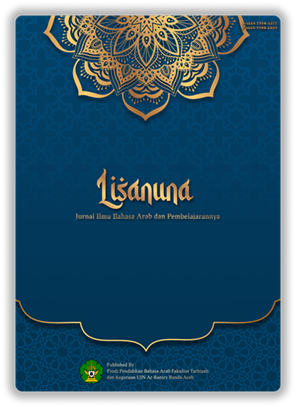تطوير مهارة الكتابة باللغة العربية لطلاب جامعة الرانيري الإسلامية الحكومية
DOI:
https://doi.org/10.22373/ls.v13i1.18027Keywords:
Development, Writing Skill, Arabic Language, Student, MethodAbstract
This article would like to discuss about the topic on how to increase capacity in writing skills in Arabic language among students of the Islamic State University (UIN) Ar-Raniry Banda Aceh, especially students of the Tarbiyah Faculty, Arabic Language Teaching Study Program. Writing skills is one of the most difficult skills to be developed in its application, even though the theory and material presented by the lecturers about it, tends to make it easier during the teaching and learning process. This article attempts to examine the precise and easy steps that can be taken in increasing Arabic writing capacity and skills among university students. This article uses qualitative methods to diagnose various factors and problems faced by students when writing exercises are applied, and this article also tries its best to offer the right methods to make it easier for students to develop writing and composing skills (in Arabic language).
References
المراجع
إبراهيم خليل و امتنان الصمادي، فن الكتابة والتعبير، (عمان: دار المسيرة)، 2008.
إبراهيم علي ربابعة، مهارة الكتابة ونماذج تعليمها، الألوكة، د. ت.
ابن منظور، جمال الدين محمد بن مكرم (ت 711 هـ)، لسان العرب، بيروت: دار صادر، 1990.
أحمد شلبي، كيف تكتب بحثا أو رسالة، (القاهرة: مكتبة النهضة المصرية)، 1968.
حسن فالح البكور، إبراهيم عبد الرحمن النعانعة، محمود عبد الرحمن صالح، فن الكتابة وأشكال التعبير، (عمان: دار جرير للنشر والتوزيع)، 2010.
عبد الرحمن الهاشمي، و فائزة محمد فخري، الكتابة الفنية (مفهومها – أهميتها – مهاراتها – تطبيقاتها)، (عمان: مؤسسة الوراق للنشر والتوزيع)، 2011.
علي أحمد مدكور، طرق تدريس اللغة العربية، (عمان: دار المسيرة)، 2007.
لويس معلوف، المنجد في اللغة والأعلام، بيروت: المطبعة الكاثوليكية، الحادية والأربعون، 2005.
مجمع اللغة العربية، المعجم الوسيط، القاهرة: مجمع اللغة العربية، 1960.
محمد شمس العلوم، معلم ويجايا، مودة الرحمة، تنمية مهارة الكتابة من خلال تصميم تعليم علم البلاغة في طلبة معهد النور الجديد العالي، المجلة العربية الدولية للتربية والتعاليم، 4 (2)، 2020.
محمد فوزي بني ياسين، القراءة والكتابة بين النظرية والتطبيق، (عمان: دار المسيرة)، 2008.
Safitri, Y., & Mukhlisah, M. (2020). Taṭbīq aṭ-Ṭarīqah al-Muaddalah Fī Talīm Qawāid al-Hamzah Li Tarqiyah Saiṭarah aṭ-ṬālibātAlā Fahm Kitābah al-Hamzah (Dirāsah Tajrībiyah Li al-Marḥalah al-Mutawassiṭah Bi Mahad Inṣāf al-Dīn). EL-MAQALAH: Journal of Arabic Language Teaching and Linguistics.
Liz Hamp-Lyons, Ben Heasley, Study Writing A Course in Writing Skills for Academic Purposes, Cambridge: Cambridge University Press, 2006.
Grab. W & Kaplan, Theory and Practice of Writing, London: Longman, 1996.
Fajrul Hadi, “Ahammiyyat al-Jawanib fi Ta’lim al-Kitabah al-‘Arabiyyah”, Didaktika, 15 (1), 2014.
Aidillah Suja, “Ahammiyyat Dirasat al-Lughah al-‘Arabiyyah fi Fahm Ma’aniy al-Qur’an (Dirasat ‘an al-Fi’l al-‘Arabiy)”, Perada, 2 (2), 2019.
Downloads
Published
Issue
Section
License
1. Proposed Policy for Journals That Offer Open Access Authors who publish with this journal agree to the following terms:
1.a. Authors retain copyright and grant the journal right of first publication with the work simultaneously licensed under a Creative Commons Attribution License that allows others to share the work with an acknowledgement of the work's authorship and initial publication in this journal.
1.b. Authors are able to enter into separate, additional contractual arrangements for the non-exclusive distribution of the journal's published version of the work (e.g., post it to an institutional repository or publish it in a book), with an acknowledgement of its initial publication in this journal.
1.c. Authors are permitted and encouraged to post their work online (e.g., in institutional repositories or on their website) prior to and during the submission process, as it can lead to productive exchanges, as well as earlier and greater citation of published work (See The Effect of Open Access).
2. Proposed Policy for Journals That Offer Delayed Open Access Authors who publish with this journal agree to the following terms:
2.a. Authors retain copyright and grant the journal right of first publication, with the work [SPECIFY PERIOD OF TIME] after publication simultaneously licensed under a Creative Commons Attribution License that allows others to share the work with an acknowledgement of the work's authorship and initial publication in this journal.
2.b. Authors are able to enter into separate, additional contractual arrangements for the non-exclusive distribution of the journal's published version of the work (e.g., post it to an institutional repository or publish it in a book), with an acknowledgement of its initial publication in this journal.
2.c. Authors are permitted and encouraged to post their work online (e.g., in institutional repositories or on their website) prior to and during the submission process, as it can lead to productive exchanges, as well as earlier and greater citation of published work (See The Effect of Open Access).

